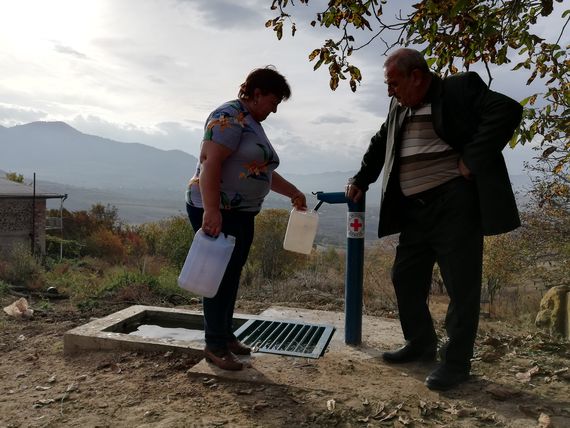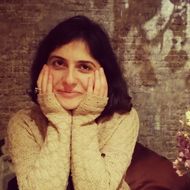
Places and events in this story are real, but this doesn’t mean that whatever is written here is truthful or that it isn’t.
Have you ever seen a people who live by the shores of a lake, who are not very rich and the lake is brimming with fish, yet they spare the fish? No, they are not vegetarians, it is simply an unwritten understanding between the two villages nestled on the opposite shores of Lake Joghaz. Do you know how big the fish are there? It is fish heaven!
հայերեն
My journey took me to this strange place sometime in mid-autumn. I walked along the shore of the neighboring villages of Uphill and Harvestful. It was a miraculous autumn, the colors of the forest were mesmerizing, the water sparkling, the roads steep and muddy - not made for just any car, this was a place for SUVs.
Let me reveal a secret - this Harvesful is a historic village. Do you remember Ashot Yerkat, the Bagratuni King? He planted a tree here in 920 A.D. and that tree still stands. The village also has a golden tree. Granted, it’s a persimmon tree, but when the leaves fall and the ripe fruit continues to hang off the branches, they look like chunks of gold.
The folks from Harvestful told me another story. Here, the women of the village hang heavy dark curtains on their windows. They don’t want the light from the house to spill out. One morning, in one of the homes, the elders of the house pulled the dark curtains back, but the light from outside did not stream in. It turns out there was a wall exactly where the window used to be. The guilty party? Most probably the daughter-in-law and the son.
Never mind if it is safe or dangerous. In the neighborhood they built a cafe and called it “Extreme.” There is nothing like it anywhere. If you find a car, you’ll have to drive for half an hour to the nearest town to find another cafe, but it won’t be “extreme.”
They built the cafe on the very last hill of the village and at the entrance a sign reads, “Entrance is free but you pay when you exit.” And the coffee here tastes so much better, it is the characteristic oddity of coffee, it pairs well with risk. And if you want something sweet with your coffee, they will offer fresh persimmons, or dried persimmons. And do you know where they come from? No, it is not from the Garden of Eden, it is from the Garden of Peace not far away from the cafe, at the very edge of the village next to that lake.
Why is the garden of peace? … Why is the cafe extreme? And those fish? Why are the windows walls?… Remember these questions and let me show you something else that we saw when we, the tourists from the city and the storytellers, visited.
We went down the curved staircase of the school and entered a room with white-white walls. There were pictures of doves, homes, the village. They were painted by the children. And the cellar, well, it was built by the adults, with the condition of never having to use it. And if it was suddenly needed, they said you could stay there for four hours.
Entrance is permitted only with a secret code. That day the bell had tolled for very long and there were many people, young and old, sitting on the long wooden benches. Seryoja was singing, everyone else too...“We will never leave our village, we will never abandon it …” and suddenly the lights went off, no one panicked...
Oh, one more thing; it has hardly been a month that the village has a new mayor. It is like they have their own Nikol. There was no other candidate during the election but the whole village showed up, stood in line, picked up the ballot and said, “Yes, we want this one. This one is good, the previous one was bad.”
The last time the village had real fireworks was the day of that election and also during a few weddings. The last one must have been Smbo’s wedding. It was not a big one, maybe some 20 guests. The bride had put on a bridal dress but it was only for the photographs.
There is something else that sounds like fireworks in the village - gunshots. Children confuse that sound with fireworks, especially when it comes from a distance.
It was because of the gunfire when during the war, some twenty years ago, that the water supply network was damaged and the residents of Uphill village had to carry water from the spring. Especially during the time of preparing preserves, walking a kilometer uphill with two buckets of water is not like ice skating you understand. They had to carry water for a week to have enough for one day of making preserves. One of the villagers, Laris says she had to buy her son a car to solve the water issue.
Now the spring is not so far away, every street has a public fountain. The same people who built the white room, built the fountains.
Generally speaking, gunshots are the biggest problem in Berkaber (Harvestful), Sarigyugh (Uphill) and in many other villages along the Armenian-Azerbaijani border.
It is because of the crossfire that the Joghazi Dam can not be used by either the Armenians or the Azerbaijanis. The surrounding area is a minefield and within target of soldiers standing on either side. Fishing is risky and extreme, just as the cafe appears to be extreme under these conditions.
By the way, the idea for the cafe was Bishop Bagrat Galstanyan’s, the Primate of the Tavush Diocese. For safety reasons, visitors will be offered bulletproof vests at the cafe, the vests are also to help the strategic geography of the place sink in. It directly faces Azerbaijan.
The bulletproof vests of the homes are the walls that cover the windows, they are there to keep residents safe, prevent them from becoming targets of bullets. The women of the house went for the dark curtains before there were the walls, so that the light in the house in the dark evening hours would not stream out and so that their home would not become a target. And it is not just the houses, the schools and kindergartens are the same… safe-not safe, safe-not safe, safe-not safe, safe-not safe...
The Peace Garden in reality exists. It is a mere 300 meters from the border. Cultivating it is dangerous because of the gunfire, but they can’t not cultivate it, they need the income. And the owner of the garden knows that peace starts at the border.
It is because of the gunfire that the International Committee of the Red Cross built the “safe room” at the school in Berkaber. There is water inside, thick blankets, first aid kits and flashlights… on the walls there are pictures and air vents. The room is meant to be a primary shelter where people can take temporary refuge from small caliber gunshots and shrapnel until they are finally evacuated or there is a ceasefire.
The Red Cross also renovated the water supply system in Sarigyugh and installed public fountains. In Soviet times, the village water supply would come from the dam in neighboring Berkaber. The water supply system was damaged in the 1990s, during the Karabakh war as you know and the village has been without water for more than 20 years now.
This unusual story began around 30 years ago when neighbors become enemies. How long it will last, I do not know. For now I can only tell you that which I’ve seen with my own eyes, and if you have not yet been there, now at least you know, that in the north of Armenia there are such villages and a divided dam, where the fish are fat and happy and die only of old age.
Images by Ashaluys Barseghyan.
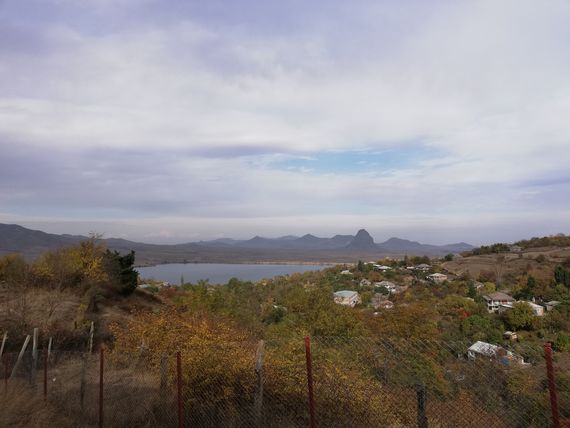
The Joghazi Dam on the Amrenian-Azerbaijani border.
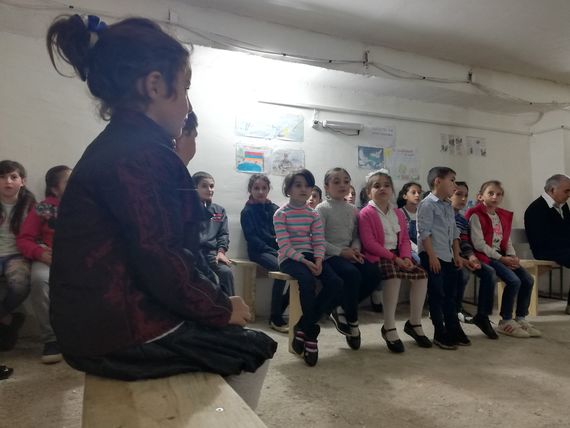
During the drill at the Berkaber school shelter.
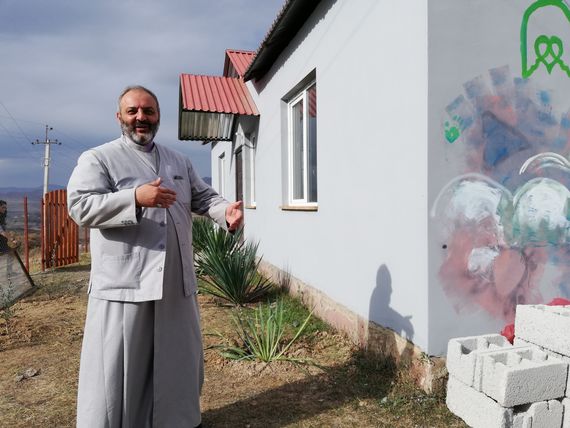
Bishop Bagrat Galstanyan at Cafe Extreme in Berkaber.
